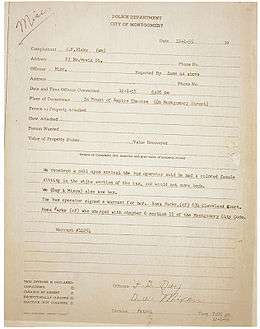James F. Blake
James Fred Blake (April 14, 1912 – March 21, 2002) was an American bus driver in Montgomery, Alabama, whom Rosa Parks defied in 1955, prompting the Montgomery bus boycott.
James F. Blake | |
|---|---|
| Born | James Fred Blake[1] April 14, 1912 Montgomery, Alabama, U.S. |
| Died | March 21, 2002 (aged 89) Montgomery, Alabama, U.S |
| Nationality | American |
| Occupation | Bus driver (1943–1974) |
| Employer | Montgomery City Bus Lines |
| Known for | Bus driver defied by Rosa Parks after he ordered her to give up her seat – eventually leading to the Montgomery bus boycott |
Early life
Born on April 14, 1912, Blake was drafted into the Army on December 23, 1943 at Fort McClellan in Anniston, Alabama. Despite his marriage after one year of attending high school, Blake also had previous experience in chauffeuring, truck, and tractor driving.[2]
He worked as a bus driver for Montgomery City Bus Lines until 1974.[3] After he retired, he became a member of The Morningview Baptist Church.[4]
Rosa Parks

In 1955 Montgomery's black leaders were preparing to make a legal case against racial discrimination on the city bus system. Rosa Parks was selected to be the central figure in a challenge to the Jim Crow laws which supported segregation.[5]
Years before, in 1943, Parks had boarded a bus driven by Blake. She entered the front door of that bus and paid her fare—as she continued on to take a seat, Blake told her to disembark and enter the bus again from the back door, a rule imposed by some drivers. She got off and Blake drove off. She waited for the next bus, swearing to herself she would never ride with Blake again (though she forgot to check who was driving 12 years later).[6]
Blake and Parks encountered each other again on December 1, 1955, when Blake ordered Parks and three other black people to move to the back of his Cleveland Avenue bus (number 2857) in order to make room for a white passenger.[7] By Parks' account, Blake said, "Y'all better make it light on yourselves and let me have those seats." When she refused, Blake first contacted the bus company and called his boss remarking, "I called the company first, just like I was supposed to do," Blake recalled in a later interview with the Washington Post. "I got my supervisor on the line. He said, 'Did you warn her, Jim?' I said, 'I warned her.' And he said, and I remember it just like I'm standing here, 'Well then, Jim, you do it, you got to exercise your powers and put her off, hear?' And that's just what I did."[4]
Parks, after being arrested, was fined $10 and $4 in court fees. Later, Blake contacted the police and signed the warrant for her arrest (Chapter 6, Section 11, of the city code gave drivers police powers for the racial assignment of seats.)[8][9] The arrest sparked the Montgomery bus boycott and led to Browder v. Gayle, the 1956 court case on the basis of which a United States District Court abolished segregation in transportation for the jurisdiction in which Montgomery, Alabama is located.
Commenting on the event afterwards, Blake stated, "I wasn't trying to do anything to that Parks woman except do my job. She was in violation of the city codes, so what was I supposed to do? That damn bus was full and she wouldn't move back. I had my orders. I had police powers—any driver for the city did. So the bus filled up and a white man got on, and she had his seat and I told her to move back, and she wouldn't do it."[10]
Death
Blake continued working at the bus company (the Montgomery City Lines became the Montgomery Area Transit System in 1974)[11] for another 19 years. He died of a heart attack in his Montgomery home in 2002, less than a month before his 90th birthday. He and his wife had been married for 68 years.
Commenting on his death, Parks said, "I'm sure his family will miss him."[4]
See also
- Claudette Colvin – preceded Parks in an earlier attempt to challenge the bus segregation laws
References
- McClellan, Bill (April 7, 2002). "Remarkable History Surrounded Man's Unremarkable Life" (payment for full view). St. Louis Post-Dispatch. p. E1. Retrieved July 27, 2009.
The attorney had grown up in that city, and he was returning for the funeral of one James Fred Blake, who had died at the age of 89. [...] Fred Blake had been the bus driver who had ordered Rosa Parks to give up her seat on that fateful day December 1, 1955
- "Electronic Army Serial Number Merged File, ca. 1938–1946 (Enlistment Records)". National Archives and Records Administration. Retrieved April 9, 2014.
- "Bus driver who gave her the wrong ticket then had Parks arrested dies at 89". Sun Herald. March 24, 2002.
- Thurber, Jon (March 26, 2002). "James Blake, 89; Driver Had Rosa Parks Arrested". Los Angeles Times. Retrieved November 16, 2015.
- "Montgomery Bus Boycott". History.com. A+E Networks. Retrieved November 16, 2015.
- Woo, Elaine (October 25, 2005). "She Set Wheels of Justice in Motion". Los Angeles Times. Retrieved July 22, 2011.
Bus drivers determined the rules. Some drivers made black passengers board through the front door to pay their fare, then reenter through the back door to find a seat. If they were unlucky, the bus would take off before they had a chance to get back on.
- Pretzer, William (November–December 2005). "The Power of 2857". American Heritage. Archived from the original on December 4, 2010.
- "City charge faced by negro bus rider". Montgomery Advertiser. December 2, 1955.
- "Montgomery City Code". IIT Chicago-Kent Law Library Blog. February 2, 2013.
- "Obituary: James F Blake". The Guardian. March 27, 2002.
- "About". Montgomery Transit – The M.